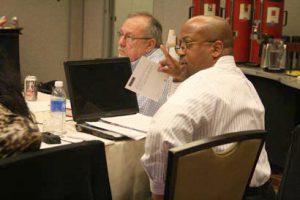Minority journalism associations look for new convention model to avoid debt
Scripps Howard Foundation Wire

Professional groups representing minority journalists are considering holding joint annual conventions because of financial difficulties.
Conventions traditionally produce the highest revenue for groups like the National Association of Hispanic Journalists.
A decline in attendance at last year’s convention held in San Juan, P.R., caused NAHJ to lose money.
“When you have less attendance and less sponsorships, that’s what happens with the convention,” NAHJ Executive Director Iván Román said. “Then you don’t have the profit you need.”
Each year the associations agree to rent a certain number of hotel rooms. If those contracts are not met, the associations must pay penalties. In 2009, the National Association of Black Journalists did not meet its hotel room requirements in Tampa.
In a June 1 letter to members, NABJ President Kathy Times wrote that the association is still paying off a six-figure convention debt and is urging members to book rooms for the 2010 convention July 28 to Aug. 1 at the official hotel, the Manchester Grand Hyatt.
The hotel is owned by Doug Manchester, who contributed money to California’s Proposition 8, banning same-sex marriage. That has led some members to ask NABJ to choose a different hotel.
“While our organization values the diversity of its members, breaking the legal agreement would cost NABJ $1.2 million. NABJ negotiated the San Diego hotel contract more than five years ago before this issue surfaced,” Times wrote.
Román said he expects that NAHJ’s June convention in Denver broke even, but a small deficit is possible. About 750 people attended the convention, down from 1,800 in 2007.
This trend is causing associations to redefine the way they do conventions. The associations meet jointly every four years for a UNITY convention, but are now considering joint meetings more often.
“We are looking at partner-ing with NABJ to hold a joint convention every two years,” NAHJ Financial Officer Russell Contreas said. “We would share the hotel cost and still have our own programming.”
Plans are still very preliminary.
“We haven’t formalized anything,” Román said. “We’ve had some discussions, but nothing concrete, but the conversations are continuing. There are pros and cons we have to really look at, and we have to see if it’s something really worth doing.”
NABJ has locked in its convention sites until 2013.
“I think in this climate, we should rotate between the associations every year,” Treasurer Gregory Lee said. “For instance, the Asian journalists would join with the black journalists, while the Hispanic journalists meet with the Native American journalists. We would have more negotiation power and we would have less exposure to hotel issues since it’s a shared expense.”
American Asian Journalists Association President Sharon Chan said AAJA does not have a host city for 2013 and is seriously considering joining with another organization for its convention. This year’s convention will be Aug. 4 to 7 in Los Angeles.
“We lost money in our convention in Boston in 2009, and it led to a deficit for the year. Our registration is up 30 percent from where we were last year, and I don’t believe we will lose any money,” Chan said. “All options are on the table for the 2013 convention.”
Conventions play an integral part in the association’s mission by bringing journalists together to build skills, meet with recruiters and other journalists of color, Chang said.
However, media companies are donating less money because of buyouts and industry bankruptcies. Since 2007, more than 2,600 minority journalists have lost their jobs.
“Hundreds have lost their jobs or left journalism,” Chang said. “Those were potential attendees at our convention that are no longer in the industry.”
Vicki Adame is one of them.
In 2007, she was let go from Vida en El Valle, a weekly publication in California.
“I was blindsided. I was in shock, especially since two days before that I had just won a national award,” said Adame, a freelancer and consultant. “They ended up finding someone who was a lot younger and less experienced.”
Adame, who paid $1,000 to become a lifetime member of NAHJ before losing her job, has continued to pay her own way to conventions. She said the organizations need to look beyond their members and corporations if they want to raise money.
“We need to start looking at fundraisers and looking beyond media companies for funding or asking members for money,” she said. “Some can give, but there are a lot who are barely making it and a lot who are out of work, so it’s not easy to ask for their wallets.”






